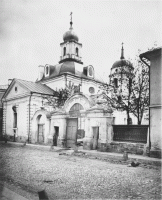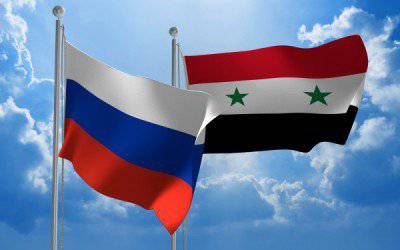Whenever Russia offers aid to Syria, western pundits often accuse Russia of sticking her nose where it doesn’t belong. Since they haven’t figured out how to read history books, they don’t see how these two nations are linked to one another, and they don’t realize that Russia and Syria have been on friendly terms for centuries.
The recent war in Syria highlighted this blind spot in the western media. In recent years we have seen CNN accuse Russia of “meddling in Syria”, Radio Free Europe accuse Russia of “interference in Syria”, and various armchair commentators claiming that “Russia has no business in Syria.” The western media seems oblivious to the fact that Russia and Syria have ties going way back, with a friendship that has lasted for hundreds of years. One of the central ties between Russia and Syria is the Christian faith.

A Syrian Church in Moscow:
the church of St. Hypatius
in the late 1800s
Orthodox Christian churches have had a strong presence throughout Russia for over 1000 years. And they have had a significant presence in Syria for twice that long. According to the Christian scriptures, the very word “Christian” was first used in Antioch, which historically was a Syrian city. Entire communities of Orthodox believers were established in Syria 2000 years ago, and many of those communities have persisted until today. Even though modern Syria is predominantly Muslim, the Syrian president and the majority of Syrian people have protected these ancient Christian communities, not wanting them to come into harm’s way.
For centuries, Russia (when not under communist oppression) has seen itself as a protector of the Orthodox Church. Many Russian Tsars supported the Church, just as President Putin supports the Christian faith today. When an opportunity arises for Russia to help the Orthodox Church, it makes sense that Russia will step in to help. In certain cases, that means helping Syria.
On December 22, 1848, Tsar Nicholas I agreed to give a valuable gift to the Orthodox Church in Syria. He gave them the church of St. Hypatius, in Moscow. He gave it to them along with all of its properties and possessions, and it was determined that all future donations to this church would be sent to Syria, to be used for educating the Orthodox Christian clergy and laity there. This situation would keep money flowing from Russia to Syria for many decades.
Of course, when the Tsar made this gift to the church in Syria, he didn’t realize what a benefit it would eventually provide to the people in Russia.
After the Bolshevik Revolution, communist leaders fiercely persecuted Russian Christians, making it very difficult for them to practice their faith. All Russian churches were required to turn baptismal records over to the communist government, as well as other written records, so that Christians could be more easily identified and targeted. For this reason, people feared getting baptized, and they feared taking their children to be baptized.
But the Church of St. Hypatius was no longer owned by the Russian church. It was now owned by the church in Syria. This made it something like a foreign embassy, and the communist government was hesitant to stir up tensions with a foreign country. This church refused to turn over its records, and the communists let them get away with it.
Thus this church became a safe haven for numerous Christians, for many years during the communist oppression. This was one place where faithful Christians could be baptized, and participate in worship, without having their names turned over the the authorities.
So when the recent war broke out in Syria, it wasn’t the first time that Syria and Russia showed up on each other’s radar. The rebels in Syria were mercilessly slaughtering Christians, and that was unacceptable to both Syria and Russia. For this reason, and for other reasons, these two nations worked together for the common good. Nothing about this is surprising, because they have been mutual friends for hundreds of years.

















